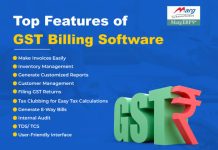Reverse Charge Mechanism (RCM) is an important concept under the Goods and Services Tax (GST) system. It is a mechanism where the liability to pay tax is shifted from the supplier to the recipient of goods or services. In this blog, we will discuss the Reverse Charge Mechanism (RCM) under GST, its applicability, and the impact it has on various stakeholders.
What is a Reverse Charge Mechanism (RCM)?
Under the GST system, there are two types of taxes – Central Goods and Services Tax (CGST) and State Goods and Services Tax (SGST)/Integrated Goods and Services Tax (IGST). Normally, the supplier of goods or services is liable to pay the GST on the supply made by him/her. However, under certain circumstances, the liability to pay the tax is shifted from the supplier to the recipient of goods or services. This mechanism is known as the Reverse Charge Mechanism (RCM).
RCM is applicable only when the supplier is not registered under GST, or is a composition dealer, or is a non-resident taxable person. In such cases, the recipient of goods or services is required to pay the tax on the supply received by him/her. The recipient can then claim input tax credit (ITC) for the tax paid under RCM.
Applicability of RCM
RCM is applicable in the following cases:
- Services provided by an unregistered supplier: If a registered person receives services from an unregistered supplier, then the recipient of services is liable to pay GST under RCM.
- Goods and services supplied by a composition dealer: A composition dealer is a person who has opted for the composition scheme under GST. If a registered person receives goods or services from a composition dealer, then the recipient of goods or services is liable to pay GST under RCM.
- Goods imported: When goods are imported into India, the recipient of goods is liable to pay the IGST under RCM.
- Supply of specified goods or services: The Central Government may specify certain goods or services on which RCM is applicable. For example, legal services provided by an advocate or a firm of advocates to a business entity are covered under RCM.
Impact of RCM on various stakeholders
RCM has a significant impact on various stakeholders, such as the supplier, the recipient, and the government.
Supplier: Under RCM, the liability to pay GST is shifted from the supplier to the recipient. This may affect the cash flow of the supplier, as he/she will not receive the full amount of the supply made by him/her.
Recipient: Under RCM, the recipient is liable to pay GST on the supply received by him/her. This may increase the cost of the goods or services received by the recipient. However, the recipient can claim an input tax credit for the tax paid under RCM, which will offset the additional cost.
Government: RCM helps the government to widen the tax base and increase the tax revenue. It also helps to prevent tax evasion by unregistered suppliers and composition dealers.
Read Other Useful Blogs:
- Importance Of Cancelled Cheque
- Future Of E-Invoicing
- Business Operations With E-Way Bill
- Importance Of Cancelled Cheque
Conclusion
Reverse Charge Mechanism (RCM) is an important concept under the GST system. It is applicable in certain cases where the liability to pay GST is shifted from the supplier to the recipient. RCM has a significant impact on various stakeholders, such as the supplier, the recipient, and the government. Therefore, it is important for businesses to understand the applicability of RCM and comply with the relevant provisions of the GST law.
Frequently asked questions about the Reverse Charge Mechanism (RCM) under GST:
- What is RCM under GST?
Reverse Charge Mechanism (RCM) is a mechanism where the liability to pay tax is shifted from the supplier to the recipient of goods or services.
- When is RCM applicable under GST?
RCM is applicable in certain cases, such as services provided by an unregistered supplier, goods, and services supplied by a composition dealer, goods imported, and the supply of specified goods or services.
- Who is liable to pay tax under RCM?
Under RCM, the recipient of goods or services is liable to pay the tax.
- Can the recipient claim an input tax credit for the tax paid under RCM?
Yes, the recipient can claim an input tax credit for the tax paid under RCM, which will offset the additional cost.
- Does RCM affect the cash flow of the supplier?
Yes, RCM may affect the cash flow of the supplier, as he/she will not receive the full amount of the supply made by him/her.
- How does RCM help the government?
RCM helps the government to widen the tax base and increase the tax revenue. It also helps to prevent tax evasion by unregistered suppliers and composition dealers.
- Is RCM applicable to all goods and services?
No, RCM is applicable only in certain cases as specified by the government.
- Is RCM applicable only to GST-registered entities?
No, RCM is applicable even if the supplier is not registered under GST, is a composition dealer, or is a non-resident taxable person.
- How can businesses comply with RCM provisions under GST?
Businesses should ensure that they understand the applicability of RCM and comply with the relevant provisions of the GST law. They should also maintain proper records of the tax paid under RCM and claim an input tax credit for the same.








